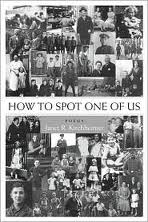TBR: How to Spot One of Us, Poems by Janet R. Kirchheimer
 One of the highlights of this past week was my attendance at a conference on “German-Speaking Jews in New York City: Their Immigration and Lasting Presence.” Co-sponsored by the Leo Baeck Institute and the Baruch College Jewish Studies Center, the conference featured several panels. I was on one of those panels, and that’s where I met Janet R. Kirchheimer, fellow panelist, poet, and author.
One of the highlights of this past week was my attendance at a conference on “German-Speaking Jews in New York City: Their Immigration and Lasting Presence.” Co-sponsored by the Leo Baeck Institute and the Baruch College Jewish Studies Center, the conference featured several panels. I was on one of those panels, and that’s where I met Janet R. Kirchheimer, fellow panelist, poet, and author.
In our session, Janet read several poems from her 2007 collection, How to Spot One of Us. The first poem she shared, “This Is How My Opa Strauss Died,” nearly brought me to tears. (The poem is available online, so you can read it for yourself. I dare you not to be moved. Then, you can read some additional poems of Kirchheimer’s on the same site.)
Janet is a daughter of Holocaust survivors, and her identity and familial experience are at the heart of this book. With this collection, as Rabbi Irwin Kula notes in his foreword, she “has taken a particular Jewish event—the Holocaust—a particular family’s experiences, and the personal and intimate details of particular people in particular places at particular moments and has aspired to a universal revelation of a new sense of reality. There is no easy catharsis here and yet as we read the poems and experience the intimacy of tragedy, loss, anguish, and despair we are invited with fierce grace to preserve our humanity and faith.” Or, as Rabbi Irving “Yitz” Greenberg adds in an introduction, these poems “…so shall the words written in this book not return empty-handed but will infuse the mind of every reader, giving life to the dead and compassion to the living.”
I’d hoped to manage to return to the conference for an evening conference session, where I’d have been able to buy a copy of How to Spot One of Us and ask Janet to sign it for me. Alas, life intervened, and I had to make do with an online order. Luckily, the book has already arrived (thank you, Amazon Prime!). And somehow, it seems to be autographed.
I really can’t wait to read this book. It’s the absolute next title on my TBR list. Perhaps it should be on yours?